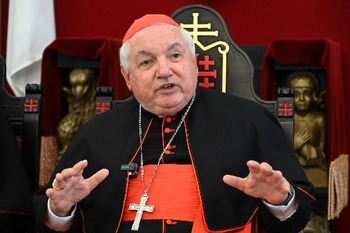-
 November 14, 2025By Caroline de Sury, OSV NewsPARIS (OSV News) -- The first plenary of the French bishops under the leadership of Cardinal Jean-Marc Aveline of Marseille as the new president of the bishops' conference did not get away from the topic of abuse.
November 14, 2025By Caroline de Sury, OSV NewsPARIS (OSV News) -- The first plenary of the French bishops under the leadership of Cardinal Jean-Marc Aveline of Marseille as the new president of the bishops' conference did not get away from the topic of abuse.
Right when the Nov. 4-9 plenary started, the Vatican revealed that one of the bishops was forced to resign over "relationships with women."
When former Bishop Jean-Paul Gusching of Verdun announced his resignation in September, he said health reasons were behind the decision. But on Sept. 4, the Vatican said that the nunciature in France was informed about his "relationships with women."
"The Apostolic Nuncio forwarded this information to the Dicastery for Bishops of the Holy See," the Sept. 4 press release said.
"Despite his persistent denials and the fragmentary and contradictory nature of the information received," former Bishop Gusching "pledged" to the prefect of the dicastery "to avoid in the future any behavior toward women that could be interpreted as contrary to his priestly vows."
For their part during the plenary, the French bishops focused specifically on the issue of priests convicted of sexual violence who have already served their sentences.
In June, a major controversy erupted in France when Archbishop Guy de Kerimel of Toulouse defended his appointment of a priest convicted of sexually abusing a minor as diocesan chancellor, saying that he had "chosen the path of mercy."
The June 2 appointment of Father Dominique Spina gained widespread attention in the country after the French daily, La Dépêche du Midi, noted the priest's 1993 conviction for sexually abusing a 16-year-old high school student, for which he was given a five-year prison sentence.
On Aug. 16, following public scrutiny of the French bishops who asked their brother bishop to reconsider his decision, the archbishop finally announced the resignation of the priest in question.
In this context, the bishops began in Lourdes a process of reflection aimed at finding common criteria, based on their personal experiences of individual cases, that would enable them to harmonize their management of such situations.
"Sometimes, simply putting these priests out on the street makes them more dangerous than if we accompany them," said Archbishop Vincent Jordy of Tours, vice president of the bishops' conference, at a press conference on Nov. 7. "We are already acting individually, on a case-by-case basis, but now we want to reflect together to try to define common ways of doing things."
"Each bishop must judge and discern what is just and merciful," Bishop Gérard Le Stang of Amiens and head of the bishops' council for the prevention of and combating abuse, explained in his conversation with KTO, a French Catholic television channel.
"Each bishop must be able to explain how he himself has dealt with these situations up to now, and see what mistakes he has made and what he could have done better," the bishop of Amiens said.
"This work of discernment is complex," Bishop Le Sang added. "Each case is different, and there is no ready-made solution."
Also Catholic schools were caught up in the abuse allegations storm in the past months and were discussed during the meeting, but mostly regarding their identity.
Catholic education under contract with the state plays an important role in the French education system, with more than 2 million students, or 17% of all French students, enrolled in nearly 7,200 schools.
In 2022, the French Ministry of Education requested that these schools accept more students from socially disadvantaged families -- the question has since arisen as to how these schools can maintain their Catholic identity while accepting more students from families who are far removed from any Christian culture.
The Catholic identity is frequently questioned by supporters of a republican school system, which they would like to see strictly secular. On Sept. 23, the new secretary general of Catholic education, Guillaume Prévost, appointed by the bishops in April, drew public criticism when he stated that Catholic school teachers have "the right" to pray with their students in class in the morning before classes begin -- a right that he says is "at the heart" of these schools' educational mission.
Many people protested against his remarks, and on Nov. 4, the Minister of Education Édouard Geffray, clearly opposed them. "A minute paid for by the state is a minute of teaching; it is not for anything else," he said.
"The church must retain its freedom to express its opinion in society, whether it is convenient or not," said Cardinal Aveline in Lourdes speaking to journalists Nov. 7. "The church has a message to convey, and it must make itself heard, whether it is easy or not."
"While the desire for identity is perfectly legitimate, identity-based extremism is a dangerous caricature of it," he said.
"As we see in our pastoral work, and particularly in welcoming neocatechumens, this desire for identity is central to many young people. We must view it positively, understand it, and nurture it, so that it is not exploited as an excuse for dangerous identity tensions."
